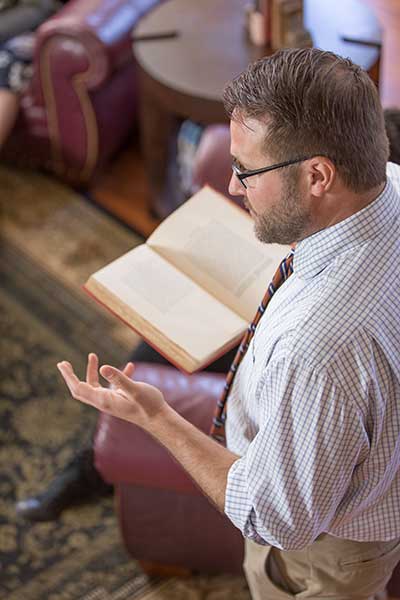Reading Great Books
Most simply put, reading, studying, and discussing great books of the western tradition puts us into contact with human beings who have long been regarded as wise. — We engage in this endeavor with the modesty of students who sense the incompleteness of their present understanding of things and the boldness of those ready to make a steep ascent – one which will inevitably include thought-provoking encounters with the momentous quarrels of thinkers who have shaped Western understanding. As we pursue our goals through careful reading, assiduous study, and friendly discussions, we recognize that our efforts may lead to an informed awareness of what the wise or reputed wise have thought and said. But as interesting as such information may be, we value far more the eminently desirable possibility that our endeavors will enable us to see more sharply and lead us to a broader and deeper knowledge of matters of enduring and ever relevant importance. Moreover, in moving towards our goals, we disavow the deleterious belief that all human beings are decisively limited or constrained in their views by the historical caves (cultures) in which they have lived. — Were this the case, one’s studies might just as well limit themselves to the happenings of great authors’ time periods and to the reigning orthodoxies of their day. Indeed, were this the case, we ourselves would be doomed exclusively to thoughts and lives shaped by contemporary thinking or by matters about which there would be broad consensus or time-serving agreements.
Still further, were authors (classical, Christian, modern) to be mere echoes of their times, places, and cultures, our efforts would only lead to a bookish erudition, fill our memories with knowledge-stones, or appeal mainly to aesthetic sensibilities. Much more, however, is in our sights when we spend time with great authors. For, we are persuaded that such authors were able to transcend the limited and limiting views of their contemporaries by taking on the permanent questions facing human beings and in some cases by rising to a transcending awareness of the eternal order of things. Indeed, it is precisely to have present in our own souls a growing understanding of “unalterable realities” that we venture to enter as best as we can into considerations of the enriching and artfully composed works of great writers.
At the same time, we do note that such authors were keenly aware of the cultural (artistic, social, political, religious) conditions of their times as well as of the thoughts and opinions of predecessors and contemporaries. Nonetheless and more importantly, the exceptional intelligences – genius even – of great authors enabled them to see more deeply and broadly than many and to leave behind works which allowed contemporaries and posterity to see something of what they saw.
One cannot, to be sure, overstate the daunting challenges which face teachers and students who approach with needed seriousness great texts. Surely, then, a single reading of any such text would be insufficient and adequate readings of all of them impossible. Additionally, in the context of classroom considerations of one great author or other, it will almost invariably be the case that teachers have had more extensive reading experience of particular authors than students. This, though, need not always mean that teachers are experts or specialists in all authors selected and discussed. Indeed, in virtually all instances in educational settings, teachers ought themselves be students of authors and texts – albeit students of greater experience than their younger counterparts.
In important ways then, students and classroom teachers are engaged in collaborative efforts in their considerations of great authors. In such collaborations, all are attempting to understand a given author as the latter has understood himself. Accordingly, foremost attention is to be given to such matters as a discernible order of presentation, the meaning of specific statements, qualifications made or called for by internal contextual matters, eventual determinations of authorial purpose(s) or intention(s). Pertinent, too would be authorial allusions (explicit or implicit), contradictions which may or may not be deliberate, surprising omissions, etc. — In the preceding interpretive or hermeneutical undertakings, question upon question may arise. The latter are undoubtedly essential steps in the pursuit of the over-all objective of understanding an author as the latter has understood himself or herself.
Still further in the search for the sometimes elusive meaning of a text is the distinct possibility of interpretive disagreements among scholars, teachers, students. Such disagreements can be especially helpful in compelling re-consideration, modification, refinement of previously held understandings. Indeed, in the experience of disputes over authorial meaning and purpose(s), it is incumbent on all to be mindful of the existence among numerous professors and scholars of widely differing interpretations and commentaries on virtually all great authors and texts. In the face of this potentially disconcerting or disturbing fact, it is necessary to realize that the existence of numerous disagreements does not lead to the conclusion that there are absolutely no true or correct interpretations of texts or no interpretations that serve as fulsome aids to gradual and more refined interpretive judgements.
In addition to the preceding challenges facing students and teachers, a second imperative emerges: that of determining whether or not an author is correct or mistaken in the view(s) or position(s) articulated or implied in his/her writings. Altogether warranted in a reader’s responses in such regards would be trenchant counter-arguments or probing observations by way of resistance to authorial assertions or teachings.
But as desirable as the practices and attitudes stated above may be in moving towards a deeper and fuller understanding of any great book, it is also crucially important to experience the powerful delight that can be found in what lies on the surface of a great text. Concomitantly, a first reading and its accompanying discussion can reveal much and represent a most helpful introduction to an author’s deeper vision.
In sum, especially important in reading great texts are a respectful and open-minded approach to an author, alert perceptiveness, and a recognition that the best teachers frown upon servile submissiveness and unthinking acquiescence.






